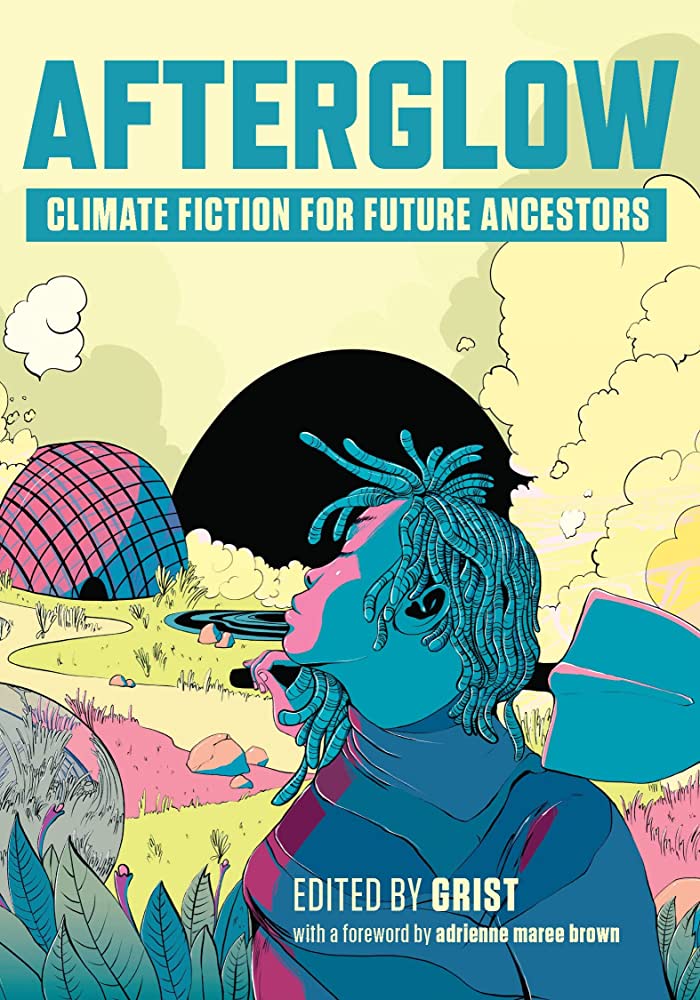The twelve stories in the anthology Afterglow: Climate Fiction for Future Ancestors (223 pages; The New Press) take readers into the future and across the globe to witness how humanity has persevered in the face of climate-crisis-induced destruction. Across its pages, readers are treated to exhilarating inventiveness, as the various contributors imagine science-fiction concepts like AI pollinators and plastic-eaters, a program that can translate the thoughts and emotions of animals, and suits that allow humans to wield the distinct strengths of insects like spiders and termites. However, the collection doesn’t simply present imagined solutions to climate change. Many of the stories credit the continued existence of their communities to Indigenous knowledge and sustainable practices like permaculture.
Compiled by Grist, a nonprofit, independent climate news organization, and by a panel of a half dozen writers that included Morgan Jenkins and Kiese Laymon, the collection is the result of a worldwide short-story contest that drew more than a thousand entries as it asked writers to “shape our climate present by envisioning our climate future,” according to the contest’s creator, Tory Stephens.
Afterglow is a refreshing tribute to our species; the characters in each story are as varied as the cultures they’ve inherited, each grappling with reality the best way they know how. In “The Cloud Weaver’s Song” by Saul Tanpepper, the most fable-like story of the collection, widespread drought forces the people of Asmara to invent a way to keep their community alive. The women of the community discover that they can harvest the air’s moisture by weaving molten glass into threads “as thin as a hair and as long as a mile” and capturing the dew that falls off of them. To capitalize on the abundance of clouds, Asmara becomes a tower and its culture identifies as the “People of the Sky.”
However, Asmara’s seemingly benevolent government Council mirrors the ignorance of real-world politicians who refuse to hear the blaring alarm of the climate crisis. Protagonist Semhar Ibrahim, a cloud weaver, notices that the clouds are sinking despite the belief that they rise each year; the Council ultimately banishes Semhar to the ground for her prognostication, a poignant reminder of how activists and truth-tellers are questioned in our time.
Not every story in the collection is as satisfyingly clear-stated as “The Cloud Weaver’s Song.” Some are more abstract: in “The Secrets of the Last Greenland Shark” by Mike McLelland, a human protagonist glimpses, presumably through an empathy chip implanted in their brain, the last moments of extinct species across history. Readers follow fragmented descriptions of these last moments and are left to decipher their significance. The human is one of four remaining representatives of a species left on Earth along with the last eagle, doe, and Greenland shark. The character finds existential relief and solace in the Greenland shark who “wasn’t capable of giving up hope” and would “pursue sustenance, pursue life, until she simply ran out of it.” McLelland’s story closes the collection, and its journey through the experiences of so many lives on the cusp of being lost forever leaves the reader not with fear, but with a profound sense of purpose: “We owed it to the ones who came before; for their sake we had to stay as long as we could.”
McLelland’s message about humanity’s purpose applies to many of the stories here. In “A Worm to the Wise” by Marissa Lingen, an undercover student journalist seeks out scandal in a squatter community dedicated to revitalizing soil but finds, in time, that she belongs with the community. In “When It’s Time to Harvest” by Renan Bernardo, an elderly woman struggles to leave behind a vertical farm she’s cultivated for decades, but realizes enjoying the rest of her life with her husband is more important. In “Broken from the Colony” by Ada M. Patterson, a trans girl finds that the pursuit of her true identity saves her and a group of other trans girls after their island is drowned.
While some stories in Afterglow experiment with ambiguity too heavily, leaving the reader partially alienated from their characters and events, many others prove seamless, leaving readers with goosebumps or existential queries. All are worthy of your time and might help quell some anxiety about the future of our shared planet.

